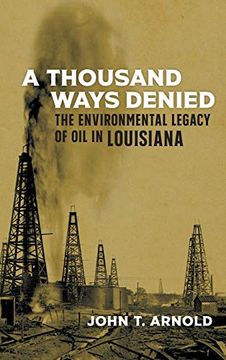A Thousand Ways Denied: The Environmental Legacy of oil in Louisiana: The Environmental Legacy of oil in Louisiana: 10 (The Natural World of the Gulf South) (en Inglés)
Reseña del libro "A Thousand Ways Denied: The Environmental Legacy of oil in Louisiana: The Environmental Legacy of oil in Louisiana: 10 (The Natural World of the Gulf South) (en Inglés)"
From the hill country in the north to the marshy lowlands in the south, Louisiana and its citizens have long enjoyed the hard-earned fruits of the oil and gas industry's labor. Economic prosperity flowed from pioneering exploration as the industry heralded engineering achievements and innovative production technologies. Those successes, however, often came at the expense of other natural resources, leading to contamination and degradation of land and water. In A Thousand Ways Denied, John T. Arnold documents the oil industry's sharp interface with Louisiana's environment. Drawing on government, corporate, and personal files, many previously untapped, he traces the history of oil-field practices and their ecological impacts in tandem with battles over regulation.Arnold reveals that in the early twentieth century, Louisiana helped lead the nation in conservation policy, instituting some of the first programs to sustain its vast wealth of natural resources. But with the proliferation of oil output, government agencies splintered between those promoting production and others committed to preventing pollution. As oil's economic and political strength grew, regulations commonly went unobserved and unenforced. Over the decades, oil, saltwater, and chemicals flowed across the ground, through natural drainages, and down waterways. Fish and wildlife fled their habitats, and drinking-water supplies were ruined. In the wetlands, drilling facilities sat like factories in the midst of a maze of interconnected canals dredged to support exploration, manufacture, and transportation of oil and gas. In later years, debates raged over the contribution of these activities to coastal land loss.Oil is an inseparable part of Louisiana's culture and politics, Arnold asserts, but the state's original vision for safeguarding its natural resources has become compromised. He urges a return to those foundational conservation principles. Otherwise, Louisiana risks the loss of viable uses of its land and, in some places, its very way of life.

